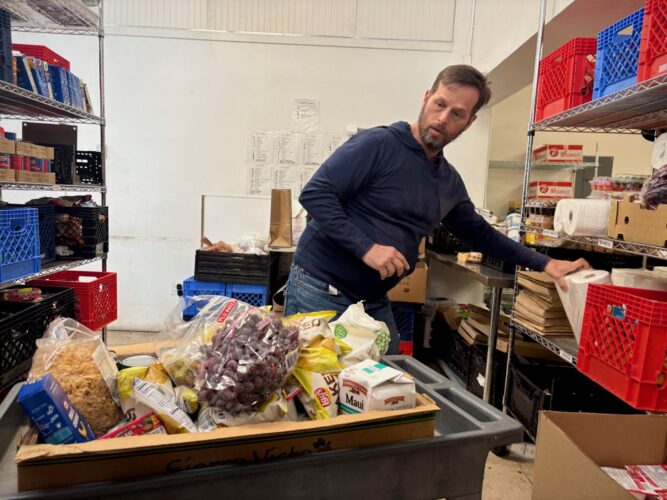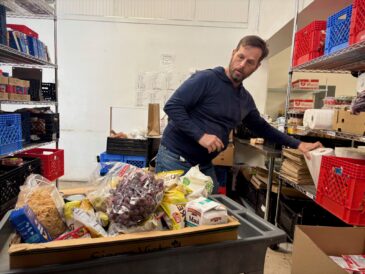‘Hopeless’: Utahns say shutdown’s pause on food stamp funding carries a steep cost
State Senate president says Utah ‘is not equipped’ to cover the program’s costs for weeks

Annie Knox, Utah News Dispatch
Bill Tibbitts of the Crossroads Urban Center helps prepare a box of food for a family at the center’s west side pantry in Salt Lake City on Oct. 22, 2025.When food benefits run out next month, Rose Wakeham is worried about losing access to more than the fresh vegetables they love to cook.
“I might have to quit school and get a different job,” said Wakeham, 28.
Wakeham’s grocery bills are covered by $200 in aid from federal nutrition benefits each month, while their part-time job at a store helps with other expenses. The idea of having to drop out of their first year of culinary school to work full time “makes me feel a bit hopeless,” Wakeham said Wednesday.
“I didn’t take the traditional route,” said Wakeham, of Salt Lake County. “I feel like I’m just now finding my path, and it’s like being blocked.”
Across Utah, about 87,000 households are enrolled in the Supplemental Nutrition Assistance Program, or SNAP. None of them will receive those benefits in November as funding for the federal program lapses in the government shutdown, the state announced Wednesday.
To administer the program, Utah’s Department of Workforce Services draws down an average of $33 million in federal funding each month, said spokesperson Christina Davis. She noted it’s possible SNAP payment cards will not work after Nov. 1, even if there’s money in the account.
Wakeham plans to donate plasma for extra grocery money and turn to food pantries next month.
“I’m stressed, definitely,” Wakeham said.
In Salt Lake City, Crossroads Urban Center’s two pantries serve more than 13,000 people per month, with traffic spiking in the days before food program benefits come in, said Bill Tibbitts, deputy executive director.
The rising cost of living doesn’t help. Tibbitts noted rent has climbed along the Wasatch Front, shooting up by double digits in 2021, with some estimates around 20%.
“The people we serve still haven’t recovered from that,” Tibbitts said. A pause in food assistance will further stretch many trying to make ends meet, he said.
“If somebody can’t feed their kids at the beginning of next month, they’re going to be mad at everybody who could’ve done something to fix it,” Tibbitts said. “They’ll be mad at the president, they’ll be mad at everyone in Congress, too. They need to come together and figure out how to stop that from happening.”
In a statement to Utah News Dispatch, Utah Senate President Stuart Adams indicated the state won’t step in next month to cover the program.
“The state is not equipped to fund federal programs for weeks or months in the absence of congressional action,” said Adams, R-Layton. “It is unacceptable for Congress to allow Utahns and Americans to bear the burden of inaction.”
Adams and House Speaker Mike Schultz urged Congress to end the shutdown to spare vulnerable Utahns harm, with Schultz faulting Democrats.
“This situation is a stark reminder of how federal dysfunction can cascade down to the states and directly harm the most vulnerable among us,” said Schultz, R-Hooper.
Michael Thomson, 59, and Natalie Rhodes, 45, of Salt Lake City, were figuring out Wednesday how to stretch their budget to make up for next month’s gap in food assistance.
“We’re going to take what we have left and we’re going to buy a bunch of ramen noodle soup and a loaf of bread and maybe a thing of peanut butter, and see how far that’ll take us,” Rhodes said. “There’s not much we can do about it.”
Thomson called the impact “devastating,” but said believes it’s largely lost on those in power.
The couple said they are homeless and have used the program to eat healthy and buy fresh fruit even though they do not have a place to cook their own meals.
Rhodes said the word that comes to mind after the state’s announcement on Wednesday is “hopeless,” especially for moms of young children.
The Women, Infants and Children nutrition program, or WIC, is still running, the Utah Department of Health and Human Services said Wednesday.
For those who receive WIC assistance in addition to SNAP benefits, the pause “can have a significant impact,” affecting families’ ability to afford groceries, the department said.



